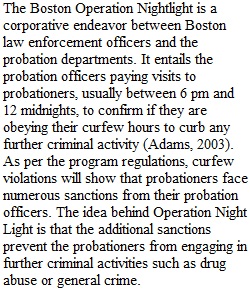


Q Evaluate INTRODUCTION The purpose of this assignment is to provide you with conceptual basis to analyze the effectiveness of the “surprise visit” aspect of Boston's Operation Night Light - a program implemented in the early to mid-1990s to focus on violent youth and the illegal gun market. Under Operation Night Light, probation officers convince judges to impose expanded probation conditions on offenders, including curfews and geographic restrictions. The premise of the program pairs a probation officer with two police officers to make surprise visits to the homes, schools, and worksites of high-risk youth probationers between 7pm and midnight, as opposed to normal business hours. If you would like to read more about the role of probation officers, please visit the following page: Probation officers and their duties under the Probation of Offenders ActLinks to an external site. Before continuing with this discussion, please watch the following video: Read the following information about Operation Night Light: • Operation Night LightLinks to an external site. • Police & Probation Partnerships: Boston’s Operation Night LightLinks to an external site. INSTRUCTIONS For this assignment, put yourself into the role of a probation officer in the current year. You have heard about Operation Night Light and are considering ways to use it in your area. However, you know that there are some potential issues with incorporating the program exactly the way it was before. There are two parts to this assignment. Part 1 Write a brief (two pages maximum) critique of Operation Night Light. In your critique, you should focus on the following: • Do you feel the threat of unannounced visits gives juvenile offenders an excuse to stay home by telling their gang leaders and associates that they would face sanctions for violating their curfew. • Do you think this is an effective gang prevention strategy? • In today’s climate, what potential issues do you see with Operation Night Light? Part 2 From the perspective of a probation officer, write a one-page memorandum (memo) to a decision maker in your area. This could be a judge, police chief, district attorney, etc. In this memo, describe your proposal for a program that would be based on the premise of Operation Night Light. Ensure to focus your submission on the specifics of what your proposed program would consist of and why you believe it would work in today's climate. Understanding how to write a memo is crucial to generating positive change and progress. The purpose of this assignment is to help you define the function of a memo; what information it should include, and how to compose one effectively. More often than not, a memo is an internal, informative document. However, in this assignment you will be writing a memo to an external recipient – which tends to happen in the criminal justice circles. When you think of a memo, make the assumption that it is seemingly like an internal press release; ideal for sharing vital information quickly, often (but not always) with multiple people at once. For this assignment you will use a memo to address challenges and announce solutions. There is a resource for how to write a memo in the quick links bar below. Use the APA citation style for references. Upload both documents as a single Word document or PDF. This assignment uses Turnitin. EVALUATION Assignments are worth 50% of your final grade and this assignment will be assessed using the rubric below. Review the rubric carefully and contact your instructor if anything is unclear to you.
View Related Questions